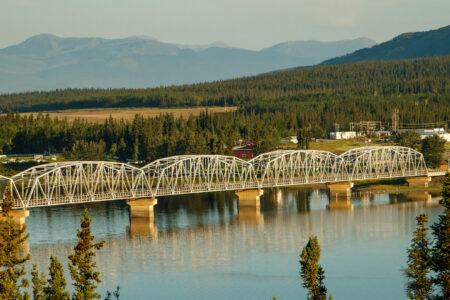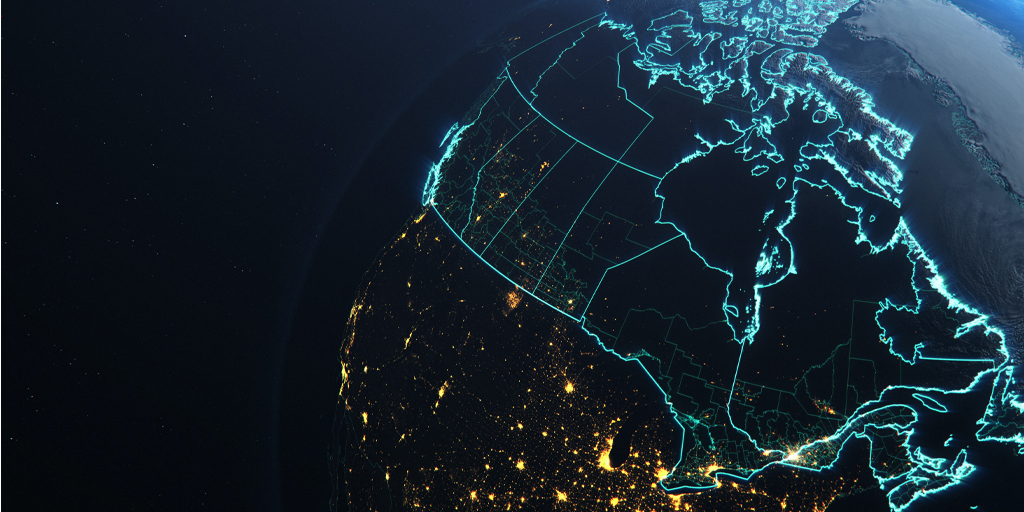
The Canada that exits the Great Quarantine may, by mid-century, become a great power. Or it may, as a mirror opposite, become a deep vassal state. The possible futures for our country, if it survives in any meaningful or recognizable form, are that stark.
In an earlier article in Policy Options, I explained that Canada has four relevant borders in this century — not just the American one, as traditionally imagined in the mental map of Canadian decision-makers over the last several decades. I call these borders “ACRE”: America to the south, China to the west, Russia to the north (across our Arctic) and Europe to the east.
Canada will live or die by this four-point game — stretched and pulled by the competing gravities of its huge neighbours (all nuclear) or pressed or even crushed by their power plays across our geography and our political and information space. Indeed, I count 15 combinations (vectors) of strategic pressures, pulls and complexity for us to manage in this century based on this four-point game: A, C, R, E, AC, AR, AE, CR, CE, RE, ACR, ARE, ACE and CRE as well as ACRE.
How will Canada survive these 15 combinations when our entire strategic doctrine is built around the single “A” (America) vector? Answer: Either we double down on the American relationship or we become a major or great power in our own right through the very process of surviving our wicked circumstances among this century’s great powers.
To be sure, if the America (A) and Europe (E) vectors are deeply familiar to Canada’s strategic imagination, then the China (C) and Russia (R) vectors are almost entirely new. For nearly all of its modern existence, Canada has not known an extremely powerful, sophisticated, largely stable China. The 19th-century Opium Wars that destabilized China ended just before Confederation, and the century and a half that it took China to restabilize — strategically, economically and intellectually — coincides almost exactly with the 153 years of Canada. Canada therefore — fundamentally, in its decision-making psyche, and more generally, in the public consciousness — still imagines China to be systemically backward, ethically primitive and geographically very distant from us.
China is today extremely advanced systemically and, crucially, far closer to Canada than we realize: that is, Beijing is closer to Whitehorse than it is to Sydney, Australia.
This is a huge mistake. For despite its pathologies and the understandable hysteria around the coronavirus pandemic, China is today extremely advanced systemically and, crucially, far closer to Canada than we realize: that is, Beijing is closer to Whitehorse than it is to Sydney, Australia. In other words, Canada is very much “in Asia” (more than our Australian brethren), and China — the world’s most important country, in all senses, coming out of the pandemic — is our de facto western neighbour.
As for Russia, it too, properly understood, is entirely “new” to Canada’s strategic psychology. Russia, in its post-Soviet form, is a relatively new state (less than 30 years old). Moreover, it is not, in the most relevant sense for Canada, to the east of Europe and Ukraine, as we may imagine it; it is in direct juxtaposition with our northern flank in virtue of the rapid melting of the Arctic. This northern Russian border, like our western Chinese (or Asian) border, is largely foreign to the mental map of a country that, from at least the publication of the 2004 National Security Policy, has reduced most of its foreign policy to a theory of the American border.
Vassalization and the American relationship
Canada may consciously elect to be vassalized under the American aegis in the context of a four-part or 15-combination game that is just too complex and brutal to navigate. If we choose this path, we will be consolidating our current trajectory, in which our strategic, economic, cultural-intellectual and political systems and frameworks are effectively intertwined with, dependent on, identified (often “as one”) with or otherwise extensions of American systems and frameworks.
Rhetorical flourishes, national myths, morality plays and foreign policy marginalia aside, Canada currently outsources most of its strategic analysis, intelligence and material power-brokering to the US. The new NAFTA (USMCA) was explicit in this regard, vassalizing us in law to Washington: to wit, Canada can have very mature economic relations, including free trade arrangements, with China, America’s principal competitor, only with the approval of the US itself.
The conflict with China over the arrest of Huawei executive Meng Wanzhou only served to highlight the extent of our vassalization (and our strategic confusion in ever thinking otherwise). The Americans, whatever their motives, asked us to arrest Meng on Canadian soil. We obliged. An extradition process naturally ensued. China applied pressure on Canada (not the US), through sanctions and counterarrests, in order to free Meng. Ottawa, caught in the “AC” (America-China) vector, instinctively went to Washington to ask for relief in the face of the Chinese pressure.
Canada’s strategic confusion in the Meng context stems directly from our incomprehension of our strategic circumstances: that is, we are working from a simplistic and dated mental map, in which only the “A” vector is of consequence. The introduction of the “C” vector caused us to double down on the only game we really know and feel, the American one. And the same, for now, would happen with the introduction of any of the other aforementioned combinations of pressures and pulls. (Canada may have many experts on America, but we have very few world-class experts on China and Russia, and zero experts on the China-Russia vector, the China-America vector, the China-Russia vector, the China-Europe, the America-Russia vector, etc.)
Of course, the vassalization of Canada (even if unconscious, to some extent) may still deliver the good life to Canadians. America may yet be a great country in this century, and Canadian vassal status in the context of an overly complicated external world may yet yield adequate strategic and economic protections and guarantees for Canada, Canadian interests and the Canadian people — including against potential adversarial pressures and pulls from other great powers at our borders.
However, we must also worry, to a very significant degree, about the opposite possibility: in the coming years and decades, America may not wish to protect us or may not be able to protect us in many or all circumstances in the context of our four-point or 15-combination strategic game. (And what if America should itself begin to regularly threaten us and basic Canadian interests?)
America may also not be a particularly wise or impressive source of intelligence, analytics or political or policy lessons. It may still enjoy the world’s biggest media platforms, including online and in social media, but such control is not to be confused with quality or authority.
As such, Canada’s vassalization could well yield perverse outcomes for our country: we are the remora to a shark that we only imagine will defend us, but whose strategic choices and preferences — degenerate or inspired — we invariably amplify. If these preferences are degenerate, our fate is sealed, as our strategic bed is made and we have nowhere else to go. And if they should require overt protection for Canada against hostile winds, we are manifestly at the mercy of the caprices of Washington — and are very much seen as such.
The road to great powerdom: Two steps
A smaller power that survives the ferocious plays of many great powers across its geography and political space may well become a major or great power in its own right by dint of sheer survival. This is the story of many major countries in historical space-time — including the US, no less.
Can Canada do this? Answer: Yes, but this would evidently require far more effort and resources than the vassalization path — which may seem intellectually familiar today but may yield catastrophic results tomorrow.
As it turns out, Canada today already has all the characteristics and trappings of a proper major power, except two: a sufficiently large population and a “term-setting” mindset – that is, a mindset that sets the terms and conditions for Canada’s own strategic life, and is able to drive many international debates. Otherwise, we have the second-largest land mass in the world, world-beating reserves and deep national self-sufficiency of nearly all natural resources, a highly educated population and, with some important caveats, significant and long-standing political and legal stability.
An Arctic demographic push and the sheer need to increase the (aging) domestic market in light of growing (post-pandemic) international trading bottlenecks and blockages could see Canada’s population reach 100 million by century’s end, with several million in the Canadian Arctic alone.
The population variable is addressed fairly logically in light of multiple factors commending to Canada a far larger demographic footprint in this century. If Canada’s total population today is 38 million, its Arctic population is but 115,000 strong — not big enough to master the huge infrastructural, economic, scientific and defence imperatives of the coming Arctic game. An Arctic demographic push and the sheer need to increase the (aging) domestic market in light of growing (post-pandemic) international trading bottlenecks and blockages could see Canada’s population reach 100 million by century’s end, with several million in the Canadian Arctic alone. Ours would therefore be larger than the population of every country in Europe, and likely larger than the end-of-century populations of Japan and Russia, assuming Russia itself survives in its current form to century’s end, which is far from assured. If the US survives in its current form — also not a certainty — then Canada would be the second-largest state in the West, with the economic mass and strategic assets commensurate with such scale.
What of a Canadian term-setting mentality — one that, at 100 million people, would allow Canada to think and act at the level of a major power surrounded by great powers? That is a far more vexed question. Education will surely have something to do with it, and political leadership and example even more.
Paradoxical though it may sound, Canadian education, after the pandemic, must absolutely avoid the seduction of prioritizing “safety” as the educational priority for next-generation Canadians. Instead, Canadian post-pandemic education must aim to be the world’s best, without qualification or sentimentality, if we are to survive the wicked strategic circumstances I describe above, and if we are to have any chance of escaping the orbit of vassalization.
As for political leadership, it too can help mould a term-setting Canadian mentality. In so doing, it will have to consciously and conscientiously, over time, resist the route of vassalization and, brick by brick, lay the intellectual and material foundations for a Canada that, in overcoming its world-historical pressures, becomes a major mover in the human condition.
This article is part of the The Coronavirus Pandemic: Canada’s Response special feature.










